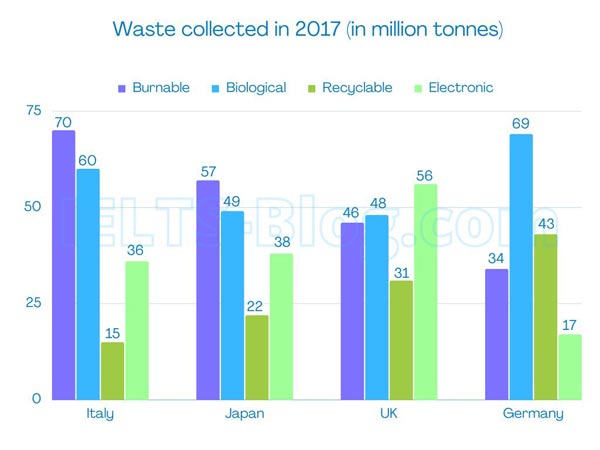New IELTS test in India – March 2023 (Academic Module)

Thanks to the lovely J.S. from India, today we are sharing the questions that he remembered from his recent IELTS exam:
Reading test
Passage 1. The text was about shops and supermarkets. The question types were fill in the blanks, matching headings to paragraphs, and multiple choice.
Passage 2. The text was on the topic of biology. The question types were summary completion with options provided, multiple choice, and matching information.
Passage 3. The question types were multiple choice, summary completion, and True/False/Not Given.
Writing test
Writing task 1 (a report)
The graph below provides information on waste collection in four countries in 2017.
Summarise the information by selecting and reporting the main features, and make comparisons where relevant.
* Note: this isn’t the actual chart given in the test, it was recreated for the purpose of demonstration.
Writing task 2 (an essay)
Nowadays parents in many countries give their children more freedom than in the past. Is this a positive or a negative trend?
Give reasons for your answer and include any relevant examples from your own knowledge or experience.
Speaking test
Part 1 (Interview)
– What is your full name?
– Are you working or studying?
– What kind of work do you do?
– Is this a popular job in your country?
– What are your responsibilities at work?
– Do you think people work more now than in the past?
– Do you feel like your workload has increased recently?
– How do you manage your workload?
Part 2 (Cue Card)
Talk about a time when you had to find some information. You should say
– when it was
– what information you needed
– where you looked for it
– and explain why you needed that information.
Part 3 (Discussion)
– In your opinion, what is a good way to find and collect information?
– Is it better to look for information online or in a library?
– Should people still use libraries nowadays? Why?
– Is television a good source of information? Why or why not?
– Is online information reliable? Why or why not?
– Are there any disadvantages to using the Internet as a source of information?



